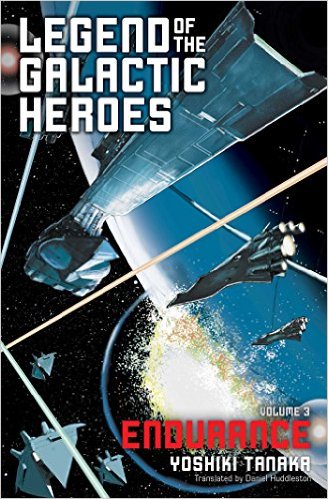
In this third installment of his Legend of the Galactic Heroes series, Tanaka delivers the space battles, political maneuvering, and philosophical musings on war and power that we’ve come to expect. And yet, Endurance, like the volumes before it, is both a fitting continuation of the series and a worthy book in its own right. Like the hero of the Free Planets Alliance (FPA), Yang Wen-Li, Tanaka thinks deeply about the motives for war and galactic domination. Indeed, it’s almost as if Tanaka is doing what Yang can only dream of- devoting himself to issues of history, power, and human frailty.
Endurance picks up after the FPA’s stunning victory over the Galactic Empire, with the former wresting control of the Iserlohn Fortress (which marks a kind of border separating the FPA and GE), and all without the usual bloodshed (thanks to Yang’s tactical genius). Now, though, the GE has dusted itself off and is ready to try a bold, hazardous plan: warp another fortress right into Iserlohn’s space and recapture it for the Empire (egged on all the while by the independent Phezzan Dominion). From there, it would be easy to invade and subjugate the FPA, which the GE has never actually recognized.
With Reinhard von Lohengramm (prime minister and head of the military for the GE) still recovering from the shock of his best friend and confidante’s death, it isn’t difficult for Tech Admiral von Schaft to convince him to try out this attempt to retake Iserlohn. Coincidentally, across the border, the civilian government of the FPA is considering how to best cut the brilliant Yang down to size and discredit him so he can’t attempt to seize power (something he would never want to do, anyway, but paranoid politicians, you know…). In what has to be an example of absolutely horrible timing, the FPA summons Yang to the home planet to try him before what is essentially a kangaroo court. Without knowing that Yang is absent, the GE follows through with its plan to attack a fortress with a fortress, and casualties quickly mount. Once the FPA hears about the face-off, however, it instantly dismisses Yang and (without so much as an apology) orders him back to Iserlohn to lead its defense.
In crisp, evocative prose, Tanaka immerses us in these intense space battles, cutting quickly between scenes to give us a broad view. At times, he gets downright lyrical, at one point describing the GE fortress moving on an intercept course with Iserlohn, like “an immense vulture taking silent flight across a void of utter blackness” (228). Further, Tanaka describes a later skirmish as “astonishingly beautiful yet at the same time horrific beyond description. Could such a disconnect really exist between beauty and virtue? Had it always existed?” (238).
This isn’t the last clash between two formidable powers, one bent upon ruling the entire galaxy, the other struggling with its internal political philosophies. I can’t wait to read Volume 4: Stratagem, out now from Haikasoru.
*Read my reviews of Volume 1 and Volume 2, as well as Charles Tan’s series overview.
